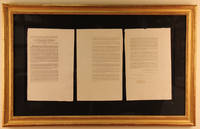
Jefferson-Signed Patent Act of 1793
de THOMAS JEFFERSON
- Usado
- Aceptable
- Firmado
- Estado
- Fine
- Librería
-
White Plains, New York, United States
Formas de pago aceptadas
Sobre este artículo
Secretary of State Thomas Jefferson signs the second U.S. Patent Act, which played a signal role in the commercial development of the United States. A key difference between this act and the one it replaced was that, in addition to new inventions, patents could be issued for improvements to existing products. The measure helped foster American innovation, successfully ushering the nation into the Industrial Revolution. We locate no other signed copies of this milestone act.
THOMAS JEFFERSON. Printed Document Signed as Secretary of State, An act to promote the progress of useful arts, and to repeal the act heretofore made for that purpose, February 21, 1793. Signed in type by George Washington as President, Jonathan Trumbull as Speaker of the House of Representatives, and John Adams as Vice President and President of the Senate. [Philadelphia: Francis Childs and John Swaine?, 1793], 4 pp. Evans 26309
Partial Transcript
"… when any person or persons, being a citizen or citizens of the United States, shall allege that he or they have invented any new and useful art, machine, manufacture or composition of matter, or any new and useful improvement on any art, machine, manufacture or composition of matter, not known or used before the application, and shall present a petition to the Secretary of State … it shall … be lawful for the said Secretary of State, to cause letters patent to be made out …."
Historical Background
In August of 1787, well into the proceedings of the Federal Convention, James Madison and Charles Pinckney recommended adding the power to issue patents to the draft U.S. Constitution. The delegates agreed without a dissenting vote. The clause appears in Article 1, Section 8, charging Congress with the promotion of "the progress of Science and useful Arts, by securing for limited Times to Authors and Inventors the exclusive Right to their respective Writings and Discoveries."
The first Patent Act was passed by Congress on April 10, 1790. It gave complete power to grant patents to a board consisting of the Secretary of State, the Secretary of War and the Attorney General. As Secretary of State, Thomas Jefferson personally examined all applications. "He was now able to keep his finger on the pulse of American discovery," Jefferson biographer Dumas Malone observed. "No compatriot of his was so well fitted to enjoy and fill such a position." Only 57 patents were granted during Jefferson's tenure, in part because of his strict interpretation of the requirement for originality and practicality. It wasn't long, however, before Jefferson and the other board members realized thatmore pressing duties left them with insufficient time to assess the applications.
This 1793 Patent Act specifically addresses the problem, charging the Secretary of State with issuing a patent to any applicant who complied with a set of prescribed formalities, swore his invention was original, and paid a fee. Also, through Jefferson's private influence, it broadened the wording to include any "new and useful improvement" to an existing product, a definition that remains to this day. To reduce the Patent Board's responsibility, however, the 1793 Act left any claims of the novelty and validity of an invention for the courts to decide. This system remained in effect for more than 40 years, by which time patents—many of them for inventions that were not original—were being issued at a rate of 600 per year. To stem the tide of derivative and useless inventions, a revised act was passed in 1836, which returned to the practice of examining an application before the issue of a patent.
Legislative measures signed by Jefferson as Secretary of State
Following a law passed on September 15, 1789, Thomas Jefferson, as Secretary of State, signed two copies of each law, order, vote, or resolution of Congress for distribution to the executive of every state. (By the same law, a single copy was distributed to each U.S. senator and representative, though these did not require Jefferson's authentication. Surviving copies are unsigned and printed on much smaller paper.) As there were 15 states at the time this act was passed, it is likely that just 30 copies were signed by Jefferson.
After checking WorldCat and OCLC FirstSearch, as well as catalogs for the American Antiquarian Society, American Philosophical Society, Huntington Library, Rosenbach Museum and Library, and Library of Congress, we have located no other signed copies of this act or of its predecessor, the 1790 Patent Act. We find no record of either one appearing at auction for at least the last 25 years.
Reseñas
(¡Iniciar sesión or Crear una cuenta primero!)
Detalles
- Librería
- Seth Kaller, Inc.
(US)
- Inventario del vendedor #
- 22424.99
- Título
- Jefferson-Signed Patent Act of 1793
- Autor
- THOMAS JEFFERSON
- Formato/Encuadernación
- No binding
- Estado del libro
- Usado - Fine
- Cantidad disponible
- 1
- Fecha de publicación
- 1793
- Peso
- 0.00 libras
- Palabras clave
- 22424.99, thomas jefferson, george washington, john adams, jonathan trumbull,
- Catálogos del vendedor
- George Washington; Signed; Thomas Jefferson;
- Product_type
- Printed Document Signed
Términos de venta
Seth Kaller, Inc.
30 day return guarantee, with full refund including shipping costs for up to 30 days after delivery if an item arrives misdescribed or damaged. Authenticity guaranteed for the life of the book or document.
Sobre el vendedor
Seth Kaller, Inc.
Sobre Seth Kaller, Inc.
Glosario
Algunos términos que podrían usarse en esta descripción incluyen:


